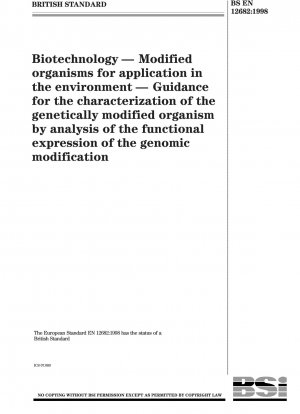BS EN 12682:1998
Biotechnology - Modified organisms for application in the environment - Guidance for the characterization of the genetically modified organism by analysis of the functional expression of the genomic modification
- Standard No.
- BS EN 12682:1998
- Release Date
- 1998
- Published By
- British Standards Institution (BSI)
- Latest
- BS EN 12682:1998
- Replace
- 96/126687 DC-1996
- Scope
- This European Standard provides guidance on the design and execution of experiments for the analysis of the functional expression of the genomic modification. It gives criteria for the set-up of an experimental design and the determination of the validity of its execution. The main factors influencing the specificity, reliability and limits of detection for an analysis are given for the following categories of experiments: —analysis of the expression of a genomic modification within GMOs (or clones of) or any specified part of them, including its response to internal (developmental stage, growth, organ or tissue location) and external factors (temperature, humidity, pH, other); —establishment of identity of a desired product resulting from the expression of a genomic modification in comparison with a reference; —characterization of the novel trait(s) of a GMO. This European Standard does not cover procedures for the analysis of pleiotropic effects of a genomic modification or the act of generating the GMO (e.g. somaclonal variation) on the phenotype of modified organisms, which cannot be predicted from the knowledge of the type of the genomic modification. However, the principles stated in this European Standard are applicable for the execution of any analysis of gene functions.
BS EN 12682:1998 history
- 1998 BS EN 12682:1998 Biotechnology - Modified organisms for application in the environment - Guidance for the characterization of the genetically modified organism by analysis of the functional expression of the genomic modification
